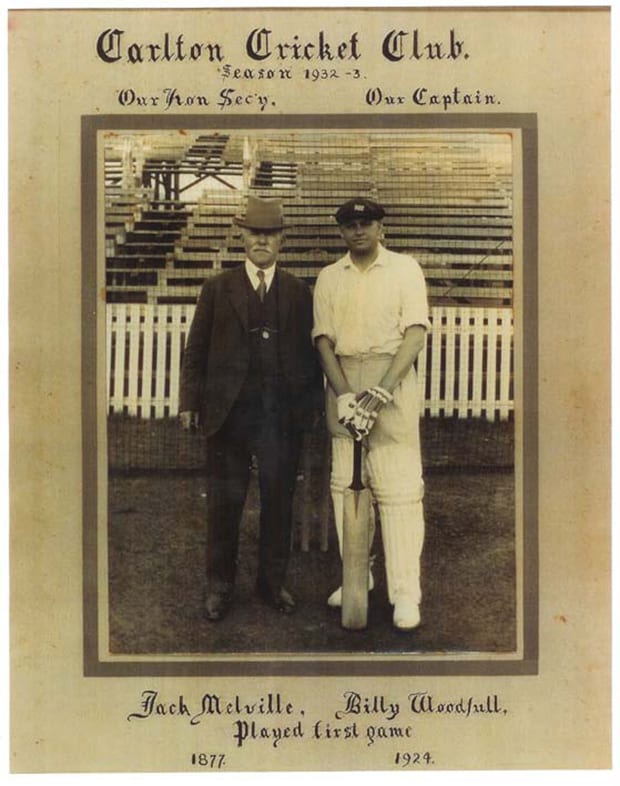This Saturday afternoon, when Carlton meets Collingwood on the 125th anniversary of its first victory over the old foe, supporters of both persuasions who value Australia’s greatest and most enduring sporting rivalry ought to spare a thought for Jack Melville.
For it was Melville, the then Carlton Honorary Secretary of 1892, who in April of that year magnanimously arranged for the Collingwood Football Club (formerly Britannia) to field a team in competition.
Born in 1856, Jack Melville’s name first appears in the record books as a representative of the Carlton outfit which met Waratah at the MCG in July 1878. A footballer of some renown, Melville was considered a laconic type. As The Footballer correspondent of 1879 wrote: “At times his coolness suggests indifference, but he has distinguished himself for all that by smart wing play, dodging and kicking splendidly”.
From 1885, Melville served on the Carlton committee, and from 1892-’95 and again in 1901 as secretary. Two years later he acted as Carlton’s VFL delegate, and from 1909 to 1939 as secretary of the Carlton Cricket Club, which he once ably served as wicketkeeper.
A Life Member of both Carlton and the VFL, Melville relinquished duties as cricket club secretary in August 1939, although The Age reporter noted at the time that the grand old man “will continue to spend his days on the Carlton oval, where he has watched every blade of grass grow”.
Melville died at the age of 87 in 1943, and was survived by his three daughters and one son Dr Hugh Melville. His other son, John Rossiter Melville, was killed in action at Gallipoli, aged 23, on April 25, 1915.
Jack Melville’s grandson Hugh Williams is one of the few remaining to have known the man.
“As I speak to you now I’m looking at a photo I have of Jack with (the former Carlton and Australian Test cricketer) Billy Woodfull,” Williams said recently.
“I very vaguely remember him (Jack). He ended up with what I now think is Alzheimer’s disease. He was very much a gentleman, a very sincere sort of bloke, and I never heard a bad word from him or about him.
“In his last years he lived with my mother, Alexandra Jean Melville in Moorabbin. The house was at No.4 Plym Street, behind the old Moorabbin pub on the corner of South Road and the Nepean Highway.”

Jack Melville with former Australian Test cricketer Billy Woodfull.
Melville’s name is forever etched in history at Carlton – and so it should be at Collingwood, whose admission into the then VFA competition only happened through his intercession as Carlton secretary.
The story goes that barely a fortnight before the first ball of the 1892 season was booted in anger, those of the black and white persuasion – the “Purloiners” as their opponents liked to dub them – were forced into admitting that they had not complied with all of their obligations under Victorian Football Association rules. As such, only 17 matches were scheduled for the ’92 season when a minimum of 18 was required, and club delegates hotly-debated the anomaly at an extraordinary meeting.
Markwell, The Australasian correspondent of April 30, 1892 best articulated the situation.
“In the struggle for matches it was to be expected that the newcomers from Collingwood should be placed at a disadvantage, and it was not surprising to learn that they had been able to secure only 17 games, and were thus practically excluded from competing for premiership honours.
However, the good sense of delegates at a subsequent meeting of the association, aided by the magnanimity of Carlton and South Ballarat, enabled them to secure their proper compliment; and though perhaps it would have been more satisfactory had they been set against Fitzroy twice, rather than against Carlton three times, they are grateful for the consideration shown them, and they deem themselves fortunate in having been vouchsafed a right to claim first honours should they come out on top.”
What had happened in effect was that Carlton, through Melville, consented to the cancellation of a scheduled match involving South Ballarat, then a provincial member of the VFA, so as to meet Collingwood on three occasions through the 1892 season instead of two to make up the shortfall.
Though The Australasian reporter noted that Ballarat football delegates were incensed that the VFA had “treated Ballarat and Ballarat clubs as nonentities”, he also appreciated that the decision had been made game’s greater good.
As Markwell wrote on the eve of the first Carlton-Collingwood fixture: “if an energetic and capable committee, a shrewd and industrious secretary, and a particularly wide field from which to select players be advantages, the Collingwoodites are to be congratulated upon the suspicious circumstances under which they make their bow to the public”.
Melville’s forward-thinking gesture was deeply felt by all at Victoria Park, so much so that the Carlton secretary was roundly applauded by Collingwood supporters as he walked the boundary line prior to that famous contest at Victoria Park – Saturday, May 7, 1892.
That match, won by Carlton, attracted 16,000 spectators, and relations between the two clubs reached new heights when the Blues donated their share of the gate takings to their inner-city neighbour’s fledgling football club.
And the rest, as they say, is Australian sporting history.


